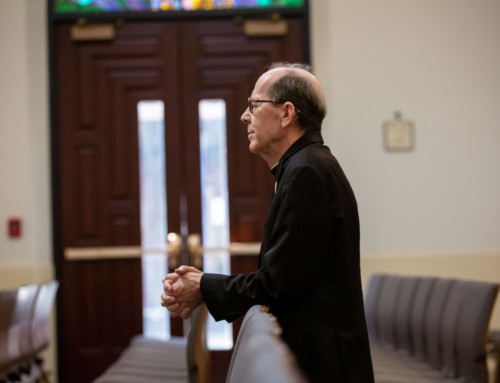St. Bakhita’s love of the Master
Following is the prepared text for Bishop Olmsted’s homily for the 13th Sunday of Ordinary Time.
June 26, 2022
Please join me in praising God for a new initiative for the pastoral care and evangelization of African American and Black Catholics in the Diocese of Phoenix, which will be known as the St. Josephine Bakhita Mission. Let me tell you a little about this remarkable saint.
Canonized by St. John Paul II in the Jubilee Year 2000, St. Josephine Bakhita is a survivor of the slave trade, a convert to the Catholic faith, and a model of forgiveness. By both word and example, she teaches us how to promote racial healing and reconciliation in a time of division, hatred, and violence.
St. Bakhita’s unusual journey to holiness began in the African country of Sudan, where she was kidnapped at nine years of age, sold into slavery, and resold several times. She suffered so much torture and trauma that she forgot her birth name. Her slave traders gave her the name Bakhita, which means “fortunate” or “lucky one.” We do not know why she was given this name, but Bakhita chose to see it as a sign from God of His love and favor. Although she knew nothing of Christ until she escaped slavery in her mid-teens, she had happy memories of her loving, affectionate family of origin.
After being purchased as a slave by an Italian consul in Khartoum, Sudan, and subsequently brought to Italy, she was quickly drawn to the goodness and beauty of the Catholic culture she encountered there. Embracing the Catholic faith, she considered herself to be truly “fortunate,” more than lucky. She said, “As a slave, I never despaired; I felt a mysterious strength within me that sustained me.” St. Bakhita could readily make her own the words of St. Paul to the Galatians, “For freedom, Christ set us free, so… do not use this freedom as an opportunity for the flesh, rather serve one another through love” (5:13ff).
Bakhita came to understand freedom in this profoundly new way. She knew how slavery crushed people, stripping them of their dignity, whereas freedom in Christ liberates them, not only from physical oppression but above all from the spiritual oppression of selfishness and sin.
Bakhita took to heart the words of Jesus , “No one who sets a hand to the plow and looks to what was left behind is fit for the Kingdom of God” (Lk 9:62). She constantly found reasons to be grateful to God, not looking back with anger or regret for what had been stolen from her as a child, but cheerfully discovering, in each new day, gifts of mercy and love from Jesus, the Lord and Master of her life. Thus, when given the gift of a little crucifix, Bakhita wrote, “When he handed it to me, I noticed that he kissed it with great devotion. He explained to me that Jesus Christ was the Son of God, and that He had died for us… I remember how, as I looked furtively at the crucifix, I experienced a strange feeling which I could not explain…” She was gazing on Jesus using His freedom, not to save Himself but to save others. Her heart longed to know more about Him and His freedom.
The Canossian Sisters in Italy helped her to learn about this freedom placed at the service of love. Bakhita wrote,
“…the saintly Sisters… helped me know God, whom I had experienced in my heart since childhood, without knowing who He was. I remembered how, as a child, when I contemplated the sun, the moon, the stars, and all the beautiful things of nature, I was wondering, ‘Who is the Master of It all?’ and I felt a keen desire to see Him, know Him, and pay Him homage. Now, at last, I knew Him. Thank you, my God, thank you.”
As Bakhita’s knowledge of Christ increased, her gratitude overflowed and led to a childlike trust in Jesus as her loving Master and Lord. Gradually, she recognized a deep longing in her heart to become a bride of Christ by entering religious life in the institute that had treated her with kindness and respect, while teaching her about the Catholic faith. However, seeing only Italian Sisters in the convent, she wondered if a Black woman from Sudan would be accepted as a member. That proved to be no obstacle; the foundress of the Canossian Sisters was well known for her missionary heart. So, the door to religious life was opened to her, and, putting all her trust in Jesus, Bakhita entered.
Looking back on her life’s journey, years later, she wrote, “When people hear my story, they keep saying, ‘Poor thing, poor thing.’ I am not a ‘poor thing.’ I belong to the Master; I am living in His house. It is those who are not wholly the Lord’s who are ‘poor things’.”
If any of us today feel tempted to self-pity, let us keep these words of Bakhita in mind: It is only those who are not one with Christ who are “poor things.”
Imagine, for a moment, St. Josephine Bakhita, delighting to pray with the words of Psalm 16, our Responsorial Psalm today:
“Keep me, O God, for in you I take refuge; I say to the Lord, ‘My Lord are you. O Lord, my allotted portion and my cup, you it is who hold fast my lot… You will show me the path of life, fullness of joys in your presence, the delights of your right hand forever’.”





